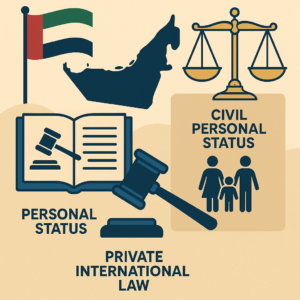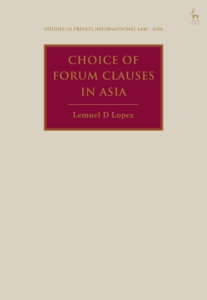Views
The Personal Status Regimes in the UAE — What’s New and What Are the Implications for Private International Law? A Brief Critical Appraisal
 Prologue
Prologue
On 15 April 2025, the new federal UAE law on personal status (Federal Decree Law No 41 of 14 October 2024) officially entered into force ( “2024 PSL”). This law fully replaces the 2005 Federal Act on Personal Status (Federal Law No. 28 of 19 November 2005 as subsequently amended) (“2005 PSL”). The new law marks the latest step in the UAE remarkable wave of legal reforms, particularly regarding personal status matters. It follows a series of significant developments at both the federal and local levels. At the federal level, this includes the adoption of the law on Civil Personal Status (Federal Decree-Law No. 41 of 3 October 2022 on Civil Personal Status) (“2022 CPSL”) and its executive regulation. At the local level, specific legislations were adopted in the Emirate of Abu Dhabi, most notably the 2021 Law on Civil Marriages and its Effects (as subsequently amended) (“2021 ADCML”), and its Procedural Regulation. These legislative efforts collectively address what is commonly referred to as “civil family law” (for further details see previous posts on this blog here, here, here, and here). Together with the new 2024 PSL, these instruments will collectively be referred to as the “Family Law Regulations” (see Table below). Read more
Opinion of AG de la Tour in C-713/23, Trojan: A step forward in the cross-border recognition of same-sex marriages in the EU?
Dr. Carlos Santaló Goris, Postdoctoral researcher at the University of Luxembourg, offers an analysis of the Opinion of Advocate General de la Tour in CJEU, Case C-713/23, Trojan
From Coman to Trojan
On 5 June 2018, the Court of Justice of the European Union (‘CJEU’) rendered its judgment in the case C-673/16, Coman. In this landmark ruling, the CJEU decided that Member States are required to recognize same-sex marriage contracted in another Member Stated to grant a residence permit to the non-EU citizen spouse of an EU citizen under the EU Citizens’ Rights Directive. The pending case C-713/23, Trojan goes a step further than C-673/16, Coman. On this occasion, the CJEU was asked whether EU law requires a civil registry of Poland, a Member State that does not provide any form of recognition to same-sex couples, to transcribe the certificate of same-sex marriage validly contracted in another Member State. A positive answer would imply that the same-sex marriage established under German law would be able to deploy the same effects as a validly contracted marriage under Polish law. While the CJEU has not yet rendered a judgment, on 3 April 2025, Advocate General de la Tour issued his Opinion on the case. While the CJEU might decide differently from AG de la Tour, the Opinion already gives an idea of the solution that might potentially be reached by the CJEU. This post aims to analyse the case and explore its implications should the CJEU side with AG de la Tour. Read more
A New Precedent in Contract Conflicts: Decoding the Tyson v. GIC Ruling on Hierarchy Clauses
By Ryan Joseph, final-year BBA LLB (Hons) student, Jindal Global Law School, India.
Introduction
The recent decision of the UK High Court (“Court”) in Tyson International Company Limited (“Tyson”) v. General Insurance Corporation of India (“GIC”) sets a critical precedent for cases that lie at the intersection of arbitration, contractual hierarchy, and judicial intervention through anti-suit injunctions. The principal issue in the case revolved around the harmonious application of two conflicting dispute resolution clauses contained in two separate agreements pertaining to the same transaction. While one provided for dispute settlement through arbitration seated in New York, the other was an exclusive jurisdiction clause that provided for dispute settlement by England and Wales courts. To resolve this apparent conflict between the two clauses, the Court relied on a confusion clause (also known as a hierarchy clause) in the parties’ agreement to rule that the exclusive jurisdiction clause, in favour of England and Wales courts, prevails over the arbitration clause. Based on this conclusion, the Court issued an anti-suit injunction against GIC from arbitrating the dispute in New York. Read more
News
[Out Now] Lopez on Choice of Forum Clauses in Asia

The Hart Series “Studies in Private International Law – Asia” continues to deliver outstanding volumes, the latest being authored by Lemuel D. Lopez (lecturer of Law at the Royal Melbourne Institute of Technology University), and titled “Choice of Forum Clauses in Asia”.
This marks the 13th volume in the series, which was launched only a few years ago in 2019, with many more volumes expected to follow.
The topic is of great significance, and this book provides a much-needed Asian perspective, shedding light on how forum selection clauses function within the region’s unique legal environment.
The book’s description reads as follows:
This book compares and explains the approaches taken by Asian courts when choice of forum clauses in international commercial contracts are challenged in litigation.
It examines key common law jurisdictions (Singapore, Hong Kong and Malaysia), civil law jurisdictions (China, Japan, and Indonesia), and hybrid jurisdictions (the Philippines).
With Asia’s ascent in cross-border trade and investment, alongside a corresponding increase in cross-border litigation, understanding how Asian courts address choice of forum clauses in international commercial contracts has never been more critical. Employing a comparative law method, the book identifies and explains the relief and remedies used by Asian courts in enforcing choice of forum clauses, analysing how their classification as either contractual or procedural in nature shapes judicial approaches. It further distinguishes choice of forum clauses from arbitration agreements and explores their interaction with other contractual provisions. Party autonomy – as the parties’ freedom to determine the contents of the choice of forum clause and the freedom to control the flow of litigation – is also critically scrutinised.Furthermore, the book investigates the factors courts consider in resolving key choice of forum clause issues (ie, enforceability; specific relief to be granted; existence, validity, interpretation of choice of forum clauses; role of mandatory rules, public policy, and international interests) and explores the prospects for future development of this area of law in Asia.
Crucially, the book highlights the unique approaches of Asian courts, while underscoring the differences and similarities among common law, civil law, and hybrid jurisdictions.
Table of Contents
1. Introduction
2. The Nature of Choice-of-Forum Clauses
3. Party Autonomy and Choice-of-Forum Clauses
4. The Enforcement of Choice-of-Forum Clauses: Singapore, Hong Kong, Malaysia, Philippines
5. The Factors Considered in Granting Relief: Singapore, Hong Kong, Malaysia, Philippines
6. Existence, Validity and Interpretation: Singapore, Hong Kong, Malaysia, Philippines
7. Mandatory Rules, Public Policy and International Interests: Singapore, Hong Kong, Malaysia, Philippines
8. Choice of Forum Clauses in Asian Civil Law Countries: China, Indonesia and Japan
9. Conclusions
2026 applications for a 6-month internship in The Hague, Netherlands
The Australian Institute of International Affairs and the Australian Branch of the International Law Association call for applications for the 2026 Peter Nygh Hague Conference Internship.
New Journal: Perspectives contentieuses internationales (PCI)
The following announcement was kindly shared with us by Fabienne Jault-Seseke
Created with the support of LexisNexis, the Review Perspectives contentieuses internationales (PCI) is a biannual academic journal dedicated to the globalization of international litigation in both its public and private aspects. Each issue features a thematic dossier, complemented by several articles outside the main topic (Varia), as well as brief focus pieces addressing current events relevant to political or regulatory developments impacting international disputes (Focus).
The editorial committee, which ensures the scientific and operational direction of the Review, is composed of Sandrine Clavel, Patrick Jacob, and Fabienne Jault-Seseke (professors at Université Paris-Saclay, UVSQ).
Three issues have already been published and are available open access.


